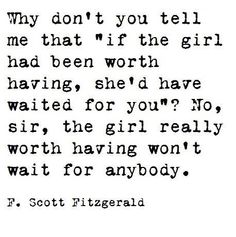Blog Archives
Book Review: This Side of Paradise by F. Scott Fitzgerald. Published in 1920.
Summary
This Side of Paradise follows the young life of Amory Blaine through the 1920s. Believing he has an extraordinary future ahead of him, the Minnesotan attends boarding school overseas and then goes on to Princeton. He leaves Princeton early and serves in World War I. The war and Amory’s time in the war are not described at all. What is described are the relationships he has with the people around him. We see him fall deeply and quickly in love, only to walk away from it a few days later. Knowing nothing about Amory’s father, we see him develop a father-son-like relationship with a man who believes Amory is his reincarnated self. The friendship between the religious monsieur nearing the end of his life and an adventurous young man who does not believe in god is an extraordinary one. Later, we see Amory fall in love again, this time to a woman who loves him just as deeply. In the spirit of the 20’s, the woman chooses to marry a man of wealth, choosing security and status over love.
The novel is known for the clear picture it paints of the 1920s. This post-WWI age was one where drinking, casual dating/kissing, jazz music and flappers were the new rage. Some critiques consider This Side of Paradise the first (and maybe only) book that truly captured the life and culture of 1920’s youth.
Scene vs Summary
Too much summary for my taste. Because of the extended timeline, a good amount of summary was needed but there were times when I would have preferred to jump into the scene and learned things for myself rather than be given an broad explanation of how events have been occurring. There were no flashbacks in the story and very little to no summarized backstory. Again, this was supported by the extended, linear plot line but it simply did not work for me. The life of the main character felt too normal. He wasn’t doing anything extraordinary, the people in his life were bland, ect. Although, I’m sure many would argue that the brilliance of the book is the way it explores ordinary life. I won’t disagree with the literary writer’s belief that every character’s life holds a story worth telling.
Autobiographical
Every writer alive has heard the phrase “write what you know” multiple times. I assume the same goes for the early 19th century when Fitzgerald wrote This Side of Paradise. If not, the phrase may have sprung into being out of this book!
Like his main character, Fitzgerald grew up in the Midwest, went to boarding school out east, attended Princeton, and dropped out to join the military. It takes place in the same years that Fitzgerald himself grew up and even a lot of the Princeton “clubs” mentioned in the book are actually present. The book is Fiction so we can assume details and characters are made-up, but I believe its safe to say that every writer portrays part of him/herself in their main character. In this instance, my guess is that Armory Blaine is an exaggerated version of the young Francis Scott.
1920’s language
There is no denying that Fitzgerald had a way with words but reading prose from nearly 100 years ago (published in 1920) can be jarring. I find it similar to reading a book written in exaggerated slang/accent or a strange structure; sometimes you fall into the grove, sometimes you don’t. I could not get into the grove of this book. Though I’m sure the language flowed beautifully in the 1920s, it was too choppy for me. The letters written between characters were specifically jarring. Is this really the way people talked to each other in the early 19th century? I suppose it was, but in 2014 it doesn’t seem realistic. So unfortunately, it threw me out of the story.
As The Great Gatsby is one of my favorite books of all time, I know this feeling does not encompass all of Fitzgerald’s work or classic literature in general.
Overall
2 Stars. It was a decent book. Although I’m sure the language flowed beautifully in 1920, it kept throwing me out of the story in 2014. The plot line was not a very engaging, the side characters came and went too quickly, and the story as a whole failed to leave an impression with me (positive or negative). Therefore, 2 stars is all it gets.
Discussion Point: Because the main character of This Side of Paradise is a teenager/young adult, would you consider this a young adult novel? Although a lot of stories with teenage characters don’t stay true to the typical young adult themes, they are often still placed on the YA bookshelf. What do you think?







